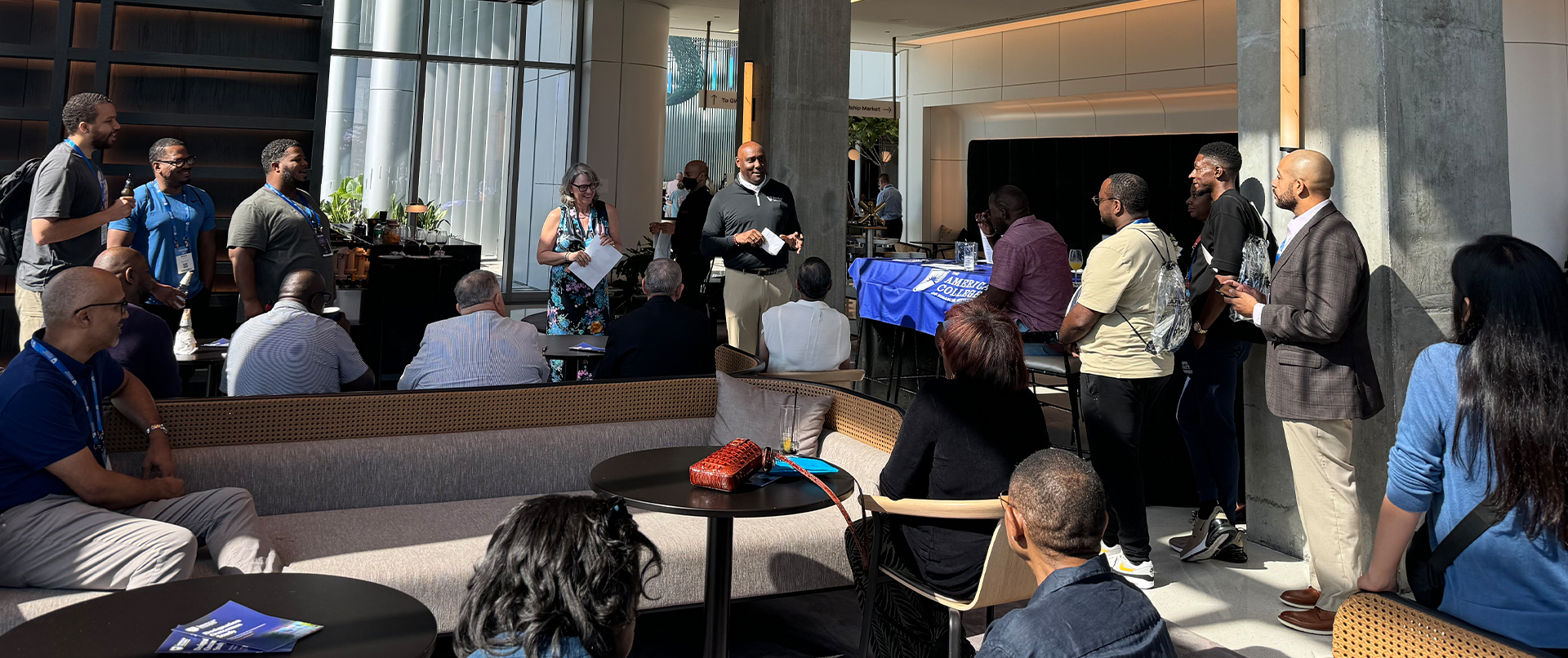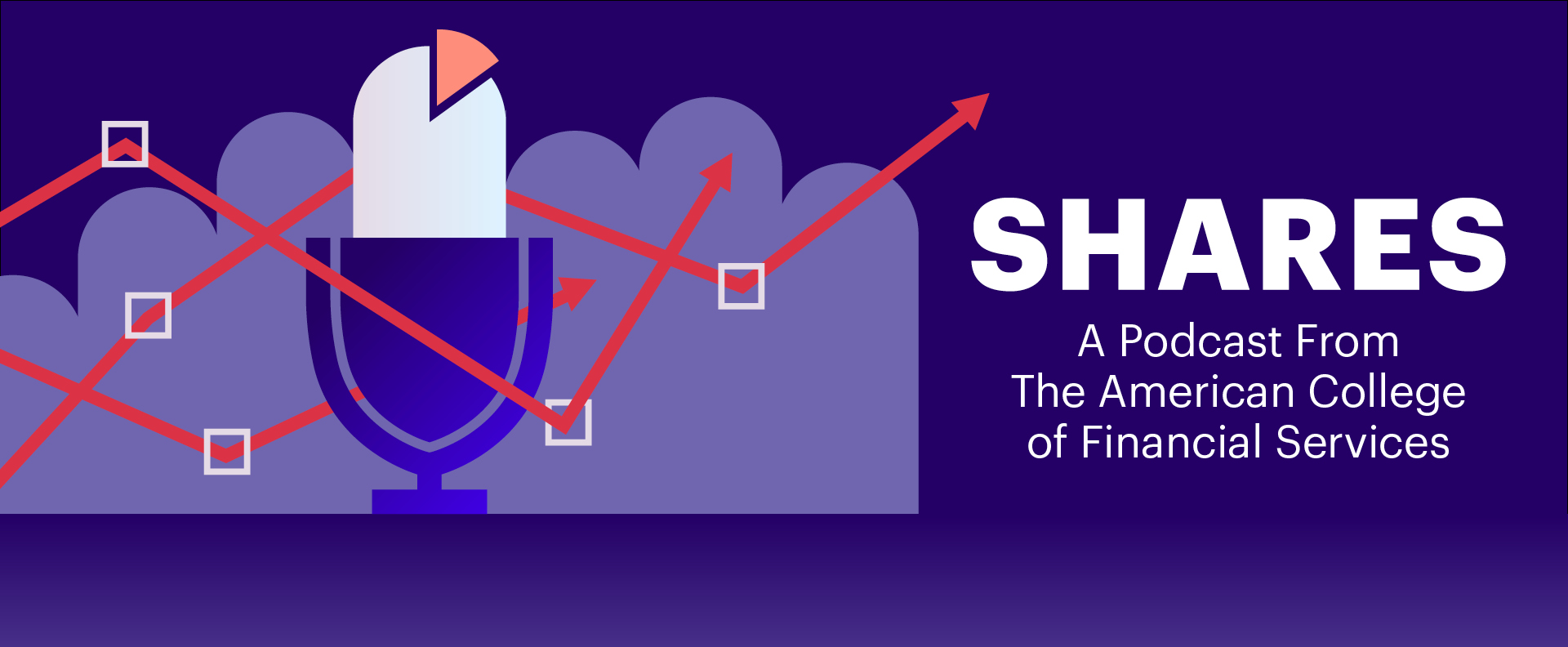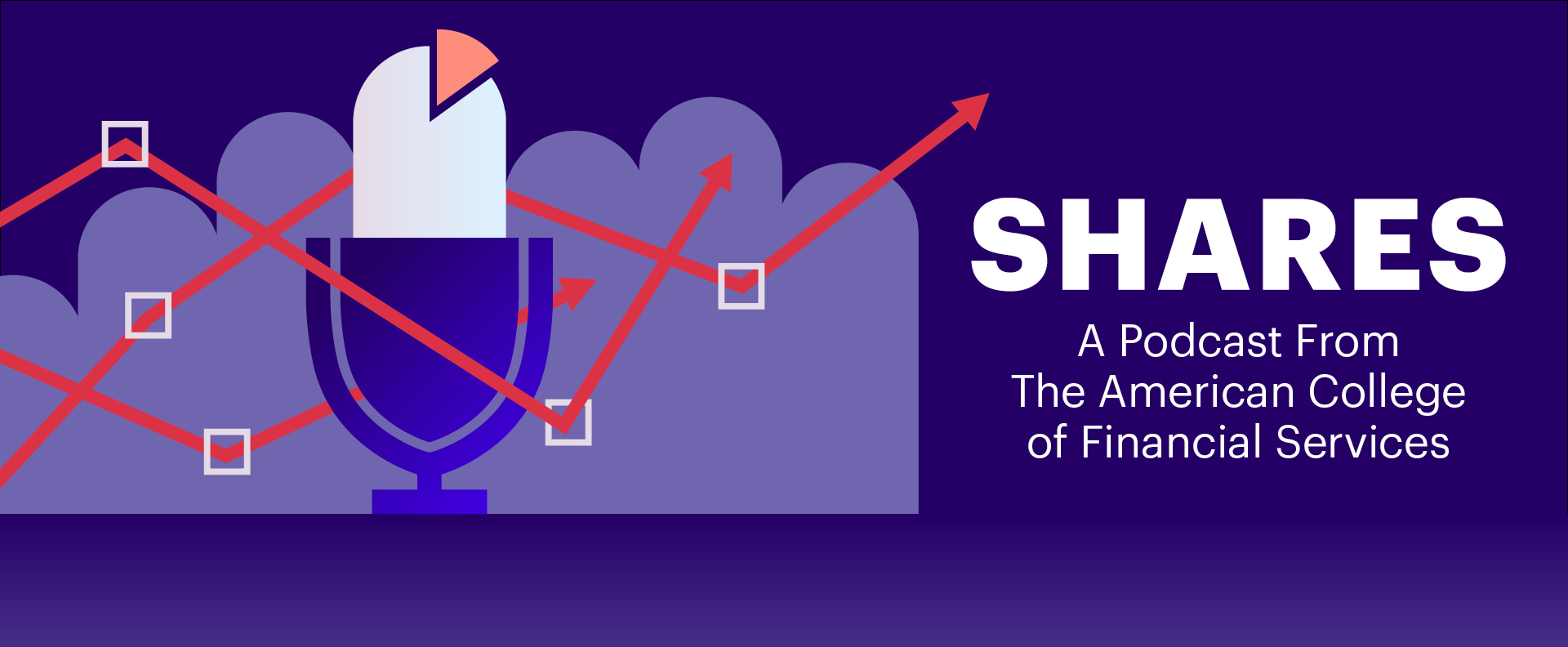About The College Diversity, Equity & Inclusion Insights
Steps to Strengthen Our Alumni Network

Our regional alumni receptions unite alumni and students with a variety of designations and offer a social setting where they can connect. These events are a testament to our commitment to cultivating a dynamic, supportive, and thriving alumni network.
At the heart of these events is the desire to strengthen our alumni network. We believe in the power of connection and collaboration, so we want to facilitate just that. By coming together, we create opportunities for professional growth and support.
Our goal is to forge stronger ties among alumni, fostering a sense of unity and shared purpose. Each reception will be an opportunity to exchange ideas, discuss common interests, and build relationships that could lead to new ventures and collaborations.
Cultivating Connections
We held our first two Regional Alumni Receptions last month in Atlanta, GA following The College’s annual Conference of African American Financial Professionals (CAAFP). Looking around the room, we witnessed College alumni sharing experiences which highlighted their diverse career paths while also finding commonalities in their journeys.
In the words of one of our alumni, some who attended “took a walk down memory lane” while recounting fond memories of studying with classmates. Other alumni and students were just beginning to launch their careers in the financial services industry, having just received their first designation only two short months ago. College president and CEO George Nichols III, CAP® and our advancement and alumni relations team listened intently to the valuable insights shared by our talented alumni.
We raised a glass to honor the successes of individuals who have made a significant impact in financial services and in their communities. These celebrations are not just about recognizing past accomplishments, but also inspiring future greatness.
A Warm Invitation for Future Gatherings
We encourage you to look out for future alumni receptions coming to your area or planned with our upcoming College events. Whether you are a recent graduate, student, or a long-standing member of our alumni family, your presence will add to the richness of our gatherings. We are eager to celebrate with you, hear your stories, and build connections that will last a lifetime.
Stay tuned for details on the dates and locations of our regional alumni receptions. We hope to meet you in person soon! Let’s come together to celebrate collective achievements, nurture our connections, and embark on new journeys as one united alumni community.
Connect with our manager of alumni relations and volunteer management Meagan C. Ryer at Alumni@TheAmericanCollege.edu for more details on upcoming regional alumni receptions coming to a city near you.
More From The College
10th Annual Military Summit

KING OF PRUSSIA, PA – August 29, 2024 - The American College of Financial Services is proud to announce the 10th annual Military Summit taking place in Philadelphia, PA on September 11, 2024, and the 12th anniversary of the founding of the American College Center for Military and Veterans Affairs. This prestigious event, hosted by the Center for Military and Veterans Affairs, will bring together members of the military community, financial professionals, and allies to honor veteran-scholars, celebrate donors and partners, and provide professional development opportunities.
"We are dedicated to providing our transitioning service members and their spouses with the tools they need to succeed both in and out of uniform," said Phil Easton, CMSgt, USAF (Ret.), Managing Director of the American College Center for Military and Veterans Affairs. "This event is not only about honoring their service but is also about equipping them with the knowledge and resources necessary for their financial and professional futures."
The highlight of the Military Summit will be the presentation of the Soldier-Citizen Award to Major General Suzanne Vautrinot, USAF (Ret.) and dinner at the National Constitution Center. With a distinguished 31-year career in the U.S. Air Force, Major General Vautrinot played a pivotal role in establishing U.S. Cyber Command and has continued to lead in her civilian life as a cybersecurity expert and board member for several prominent organizations.
“Receiving the Soldier-Citizen Award is a profound honor," said Major General Vautrinot. "I am proud to join The American College of Financial Services and its dedicated sponsors in our shared commitment to supporting the military community, and I look forward to celebrating the achievements of our veterans and scholars at this remarkable event."
The Summit underscores The College's steadfast commitment to the Center's mission of empowering those who serve, supporting military members and their spouses through career transition via educational and employment opportunities within the financial services. The day-time portion of the event will be held at the W Philadelphia and feature the Maury Stewart Lecture series, supported by Center Founding Partner and Sponsor Penn Mutual, with keynote speaker Michelle Caruso-Cabrera, CNBC Contributor and CNBC's first Latina Anchor, leading a session called "Building Leaders in the Financial Services Industry."
Following the lecture series, attendees will have access to three additional workshops with subjects on retirement income and wealth management, the impact of Artificial Intelligence on the financial services industry, and culminating with a fireside chat on leadership with the 2024 Soldier-Citizen recipient Major General Suzanne Vautrinot. The event will also feature a networking lounge specifically for Military Resource Groups (MRGs) and scholars, providing a unique opportunity to connect with industry leaders and peers. The Summit is designed to foster professional growth, networking, and a deepened commitment to giving back to the military community. Attendees will gain valuable insights from industry thought leaders, enhance their professional skills, and participate in sessions that qualify for CE credit hours.
Join us in Philadelphia to celebrate our veterans, learn from experts, and network with like-minded professionals who are committed to serving those who serve. For more information, visit https://events.theamericancollege.edu/military-summit-2024.
###
ABOUT THE AMERICAN COLLEGE OF FINANCIAL SERVICES
Founded in 1927, The American College of Financial Services is the nation’s largest nonprofit educational institution devoted to financial services professionals. Holding the highest level of academic accreditation, The College has educated over 200,000 professionals across the United States through certificate, designation, and graduate degree programs. Its portfolio of applied knowledge also includes just-in-time learning and consumer financial education programs. The College’s faculty represents some of the foremost thought leaders in the financial services industry. Visit TheAmericanCollege.edu and connect with us on LinkedIn, Twitter, Instagram, Facebook, and YouTube. Discover all the ways you can expand your opportunities with us.
Contact
Sarah Tremallo
908-967-0381 / Stremallo@jconnelly.com
Lindsey Allumbaugh
678-643-1310 / Lindsey.allumbaugh@theamericancollege.edu
College News Roundup Week of August 26 2024
The Atlanta Journal-Constitution | Atlanta Fed President Open to a Rate Cut This Quarter, but Not Sold Yet
August 14, 2024
Raphael Bostic, PhD, president of the Federal Reserve Bank of Atlanta, speaks with College president and CEO George Nichols III, CAP®, at The College’s 2024 Conference of African American Financial Professionals (CAAFP) about the current economic situation and the importance of transparency with the public.
Financial Advisor | How Childhood Experiences Impact Client Views On Money
August 15, 2024
FinServe Network ambassadors Terry Parham, CFP®, ChFC®, CLU®, RICP®, WMCP®, MSFP and Angie Ribuffo, CFP®, RICP®, ChFC®, CDFA®, CLTC®, WMCP® discuss their experiences at The College’s 2024 Conference of African American Financial Professionals (CAAFP) and reflect on how they rely on their personal experiences to serve diverse groups of clients.
Forbes | A “What-If” Income Solution For Retirees
August 27, 2024
Professor of practice Steve Parrish, JD, RICP®, CLU®, ChFC®, AEP® discusses the uses of qualified longevity annuity contracts, or QLACs, in retirement planning and how they can provide a helpful solution for many retirees – even if some may not want to consider it.
Author
Subscribe to Newsletter
Related Posts
INDUSTRY EVENT: Carson Group Excell
Diversity, Equity & Inclusion Podcasts
Monetary Policy in Practice

In this special episode of our Shares podcast recorded on August 13 at The College’s 2024 Conference of African American Financial Professionals (CAAFP), senior reporter for ThinkAdvisor John Manganaro speaks with Raphael Bostic, president and CEO of the Federal Reserve Bank of Atlanta. They discuss the importance of diverse representation in policy making, views on contemporary markets, and how to navigate making financial decisions that affect Americans’ lives.
Raphael Bostic took office June 5, 2017 as the 15th president and chief executive officer of the Federal Reserve Bank of Atlanta. He is responsible for all the Bank's activities, including monetary policy, bank supervision and regulation, and payment services. In addition, he serves on the Federal Reserve's chief monetary policy body, the Federal Open Market Committee (FOMC). The Federal Reserve Bank of Atlanta serves the Sixth Federal Reserve District, which covers Alabama, Florida, and Georgia, and parts of Louisiana, Mississippi, and Tennessee. The Bank has branches in Birmingham, Jacksonville, Miami, Nashville, and New Orleans.
This episode is a collaboration with ThinkAdvisor.
Any views or opinions expressed in this podcast are the hosts’ and guests' own and do not necessarily represent those of The American College of Financial Services.
More From The College:
Learn About CAAFP
Visit Our Center for Economic Empowerment and Equality
Diversity, Equity & Inclusion On-Demand Webcasts
Wealth Gap and Strategies to Combat
Listen as our thought leaders explore recent data on racial and gender wealth gaps, how financial crises disproportionately affect Black and Hispanic families, the critical role of financial education in building and sustaining wealth, and more.
College News Roundup: Week of August 19, 2024
CNN | Best Annuities for Retirement in 2024
August 15, 2024
James Karthaus, CFP®, CLU®, ChFC®, MA, assistant professor of financial planning, explores how annuities and guaranteed income can be leveraged in retirement planning – including adjusting strategies for inflation.
Practice Management Wealth Management Insights
Personal Relationships and Financial Services

“I was the oldest grandchild on both sides of my family, and a lot of expectations fell on me to give good advice – and money was one of the most important parts of that,” he said.
Acting on that impetus, Williams started in financial services as an advisor, often going door to door to solicit new clients and work with existing ones. These days, he’s a vice president and regional practice management consultant within JPMorgan’s practice management division, consulting with financial advisors across the Southeast, Mid-Atlantic and New England regions. He says his career journey has been an evolutionary one in many ways.
“It’s given me a lot of insight into how to not just be a better advisor, but also how to run a successful business,” he said. “When you start out in this industry, you often have to wear a lot of different hats: sales, operations, compliance, managing and planning, and more. It can really weigh on you sometimes, but it teaches you a lot about who you are.”
“When you start out in this industry, you often have to wear a lot of different hats…it can really weigh on you sometimes, but it teaches you a lot about who you are.”
Sculpting Skills to Succeed
Williams says many elements of his more than 15 years of experience in wealth management and financial services made him aware of the power of knowledge and leadership – among them his stint in The College’s Black Executive Leadership Program.
“The College brings financial knowledge, education, and acumen to the table in a way that’s just phenomenal,” he said. “So, when my then-managing director reached out to tell me about this new program The College was starting up, it was kind of a no-brainer for me.”
The Black Executive Leadership Program offers high-potential Black and DEI-committed professionals ready to advance in corporate leadership the resources to power their next career steps. With its hybrid online and in-person program and its model of executive sponsors and student fellows collaborating in both settings, it’s helped set many rising leaders up for success, and Williams praised the culturally relevant insights of the curriculum.
“You can only learn so much in a textbook; it makes you aware of the issues, but not always how to navigate them,” he said.
When it comes to practice-building advice, Williams offered four key points for advisors to consider:
- Look for people who are looking for you. “Many of us are looking to improve and advance ourselves in the business, and the Black Executive Leadership Program reminds us of a lot of cultural and social issues at play and business dynamics that can have an impact on growth,” Williams said. He further explained that it’s important to find a workplace where professionals believe they belong and will be heard.
- Preparation is key. “You have to be detail-oriented, understanding the nuts and bolts of the business,” Williams said. Only then, he says, can professionals continue moving in the direction they want successfully – and hopefully have fun while they’re doing it.
- Develop your emotional intelligence. Often in business and in life, things won’t turn out the way you want them to; the defining factor is how you respond to it. Williams emphasized that it’s important to separate the ego from the professional workplace. “If a client or potential client says no, that’s okay, and there’s usually a reason for it,” he said. “Instead of getting offended, take a minute to ask them questions and try to find that reason. They may respond with something you hadn’t considered that can help you get them to yes.”
- Understand how your business model operates. “Before we even sit down with clients to have investment or other conversations, we have to understand exactly how our business is set up so we can help our clients understand, too,” Williams said. He says programs like the Black Executive Leadership Program and other learning opportunities exist to assist professionals in crafting these business models and developing their communication skills.
“The College brings financial knowledge, education, and acumen to the table in a way that’s just phenomenal…it was kind of a no-brainer for me.”
Building Client Relationships
Financial professionals are often told about the need for building strong client relationships – but Williams says his experience shows it’s even more important than some may think.
“Financial advice often has very little to do with finance,” he said. “It’s been a long time since I’ve had a Series 7-related question. Alpha, asset management strategies – these are table stakes. Relationships are the selling point of your business.”
Williams emphasized that his interactions with clients often border on life counseling in addition to financial planning and investment management – and it’s important advisors get comfortable with and be prepared to take on that role.
“Personal finance truly is personal: you’ll find yourself talking to your clients about things that have nothing to do with money. When feelings are tied into money, it becomes a highly emotional situation. It’s a sensitive subject, and you’ll become part of all kinds of conversations you never expected.”
So, how does an advisor build the kind of trust-based relationships it takes to make these connections possible? Williams advises a sound knowledge of yourself, your business, and your values – which, in turn, will give you confidence.
“There are a lot of options out there for financial planning these days, and people are often hesitant. You have to make them believers in what you’re offering,” he said. “Clients pay close attention to your attitude and your process while working with them – so you need to focus on strong communication and adding value in each interaction you have with them.”
“Financial advice often has very little to do with finance…relationships are the selling point of your business.”
It’s also often cited that financial services is a high turnover industry, with many new advisors lasting less than five years before transferring out of the business: according to Advisorpedia, 90% of advisors quit the profession within three years. Williams, however, says the ingredients for success are there as long as professionals are willing to look for them – and prepare themselves for the long haul.
“My father used to tell me about how his experience with success in law happened almost overnight. It’s not that way for most business owners, including those in financial services,” he said. “Stamina is critical. Discipline, emotional intelligence, and consistency are all things I learned along the way. The key to making it is modeling your business to run efficiently and give your clients confidence. That way, you have the confidence you need to sleep at night and spend time with your family.”
Learn More From The College
Meet Our FinServe Network.
CFP® Certification Education Program.
Philanthropic Planning Tax Planning Insights
Making a Tax Plan for Planned Giving

Join The College’s Chartered Advisor in Philanthropy® (CAP®) Program Director and Assistant Professor of Philanthropy Jennifer Lehman PhD, JD, CFP®, CAP®, as she discusses how to account for tax consequences when assisting clients in making charitable contributions and other forms of planned giving in this new continuing education (CE) opportunity available on Knowledge Hub+!
Whether you’re a financial advisor or a professional representing any other area of the philanthropic advising ecosystem, you should be familiar with tax regulations in order to assist clients as they devise their strategies for planned giving. The College and charitable giving expert, Jennifer Lehman provide key details in Planned Giving: Fun with Taxes and Probate.
What is Probate?
Lehman begins this discussion by explaining the concept of probate to listeners. “Probate is a legal process … that transfers property after somebody’s passing.” Probate is meant to re-title assets that are not already re-titled through some other method (such as a valid beneficiary or automatic survivorship).
However, not all cases in which the transfer of property occurs involve the process of probate. Some smaller families without significant assets may simply agree on how to divide an individual member’s wealth after their passing.
Probate can also differ on a case-by-case basis. Lehman goes on to discuss how probate looks when an individual dies with a will in place and compares the differences in the process when an individual dies without one. She also describes what parts make up this process and what participants can expect.
Lehman goes on to share her major takeaway that provides a high-level understanding of people’s relationship with probate. According to Lehman, probate is an expensive and onerous process. “It is a process that people like to avoid. So, the way to avoid probate is to plan during life for what will happen to your things when you pass.”
Giving During Life vs. After Death
Lehman discusses several methods of planned giving that clients may want to consider, starting with giving to individuals, such as a family member, and the differences between giving during life and giving after death. She emphasizes several important factors to consider, including step-s up in basis, long-term holdings, and annual gift tax exclusions, among others.
However, one key factor cannot be optimized for the best tax situation. Lehman reminds advisors, “The downside in waiting until death is you don’t get to see the benefit to the individuals or the charity as far as how they use the money and what they do with it.” This can be a major deciding factor for some clients, as they may like to see the benefits of their giving before passing away.
Gifts Your Clients May Want to Consider
Lehman highlights several forms a client’s gift may take, including gifts that can take effect during life such as cash, donor advised funds (DAFs), stocks and bonds, real estate, and qualified charitable distributions (QCDs). She continues by comparing these types of gifts to gifts that can be planned in life, but do not take effect until death, such as retirement assets, life insurance, life estate, DAFs, and individual retirement accounts (IRAs).
For continued giving, clients may also want to consider gifts that generate income such as annuities, remainder trusts, and lead trusts. These allow clients to impact their recipient of choice for years to come rather than as a single transaction.
All of these gifts have various factors to consider, and the best choice may not be the same from one client to another. By mastering the principles Lehman shares in this discussion and following her guidance when offering clients recommendations, advisors can help their clients achieve all of their gift-giving goals and more. She elaborates on these in greater detail in Planned Giving: Fun with Taxes and Probate on Knowledge Hub+.
To access this learning opportunity and other valuable CE, visit Knowledge Hub+.
More From The College
Gain philanthropic and legacy planning knowledge with our CAP® Program.
Learn about the American College Center for Philanthropy and Social Impact.
Join the waitlist to be notified when enrollment opens for the TPCP™ Program.
Securing RMDs in Retirement Planning

In this episode of our Shares podcast, host Eric Ludwig, PhD, CFP® joins Denise Appleby, MJ, APA, AKS, CISP, CRC, CRPS, CRSP – creator and CEO of Appleby Retirement Consulting and a preeminent retirement planning thought leader featured on The College’s Knowledge Hub+ platform – for an in-depth look at new RMD regulations and what they mean for retirement planning. Specifically, Appleby explains how rules surrounding the choosing and managing of beneficiaries for retirement accounts have changed thanks to the SECURE 2.0 updates, and what that means for your practice moving forward.
Denise Appleby, MJ, APA, AKS, CISP, CRC, CRPS, CRSP is a nationally recognized IRA expert and author of several books on IRAs. She is an IRA trainer, speaker, and consultant on IRAs and employer plans for small businesses. She has trained thousands of financial, tax, and legal professionals and helps them avoid mistakes with their clients’ retirement accounts and, where possible, fix mistakes. Due to her knack for working with IRA custodians to correct IRA mistakes and resolve other complex IRA-related issues, Appleby has earned the reputation of “The IRA Whisperer.” She graduated from John Marshall Law School, where she obtained a master of jurisprudence in employee benefits and has earned several professional designations for IRAs and employer plans.
Any views or opinions expressed in this podcast are the hosts’ and guests' own and do not necessarily represent those of The American College of Financial Services.
More from The College:
Learn about our RICP® Program.
Visit the Center for Retirement Income.